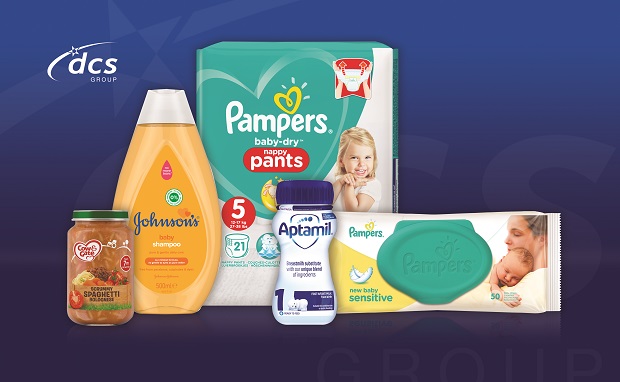DCS Group, the UK’s leading distributor, is helping wholesale and convenience retailers drive more sales through main shop missions by promoting the right range of Baby Care products in its third Destination Convenience webinar.
 “Baby Care shoppers with young families are a lot more valuable than the average shopper,” said Matt Stanton, Head of Category and Insight at DCS Group. “Typically they spend 38% more than the average shopper and are clear about what brand they want, and almost all (86%) plan their shop in advance. But, crucially, 62% of parents who buy Baby Care products agree that they will go elsewhere in their local community when they can’t find the brand or product they are looking for.”
“Baby Care shoppers with young families are a lot more valuable than the average shopper,” said Matt Stanton, Head of Category and Insight at DCS Group. “Typically they spend 38% more than the average shopper and are clear about what brand they want, and almost all (86%) plan their shop in advance. But, crucially, 62% of parents who buy Baby Care products agree that they will go elsewhere in their local community when they can’t find the brand or product they are looking for.”
The distributor says convenience stores can continue to attract parents with young children and make the most of a dedicated area of shelf space. “Getting the Baby Care category right will allow stores to capture more main shopper missions and grow overall sales and profitability in wholesale and convenience.
“We know that pre-planned research is a huge aspect of the purchase process for the majority of Baby Care products. From a selling perspective, by investing in the right product range, convenience stores can capitalise.”
Community convenience stores are ideally placed to support young families at this time. “We know shoppers are still choosing the convenience channel to do more of their main shop and with any retail category, it is important to have products available to customers at all times,” he added.
During the webinar the group identified the areas in which wholesale and convenience should focus on in order to tap into this mission driven category. This includes:
- Main shop pack sizes, alongside top-up sizes
- Main shop categories and premium tiers
- Offer great value to the shopper – give them permission to stock up now, and take away their immediate need for a supermarket trip
“Infant feeding is worth more than half (55%) of the total Baby Care category and it is essential to get it right. As such a high proportion of Baby Care shoppers plan their shop in advance, they will visit a retailer that they know stocks the right product, so convenience stores will want to keep a range of infant formulas in stock.
“The baby milk category has tremendous brand loyalty – shoppers will not change their formula brand. 70% per cent of those who are specifically shopping for formula will go to a different store if they cannot get exactly what they want in terms of brand and stage,” said Stanton. “Aptamil and Cow & Gate are the top two brands in terms of market share, so these should be the priority. Stage 1 is the most important, followed by Stage 2. Stage 3 can be added in larger stores to drive incremental sales. A mix of powder and ‘ready-to-feed’ bottles is important too, especially for stores in transient locations where shoppers are on the move.”
Nappies is another area where there is massive competition in the market. Nappies are worth 25% of the total category with the discounters and supermarkets also providing their own label alternatives in order to capture high value young family shoppers. Despite this, Pampers is still the market leader with 55% share of the total market and 86% share in the independent convenience channel.
Stanton highlighted how Nappy Pants are the fastest-growing format with just over 30% of the total market. “With space tight in convenience stores, taped nappies are still the core recommendation as they’re still the biggest format, but there is a great opportunity for larger stores to stock both varieties and grow sales.”
In the baby wipes segment, price is the shopper’s most important decision factor when deciding what to buy. “The £1 price point is key and both Pampers and Huggies hit it. Prioritise sensitive baby wipes and that way stores are also in a great position to cater for other personal hygiene needs, as health and safety is high on customers’ agendas now,” he added.
“As babies grow into toddlers, parents may need products like insect repellents and sunscreens in the warmer months and treatments for coughs and colds in the winter,” said Stanton. “Creating appropriate seasonal displays is a great way to maximise sales across different product categories. In addition, Johnson’s continues to dominate in independents in the core range of baby toiletries (94% share) due to their key price points, and Sudocrem healing cream completes the recommended core range.”
New parents tend to seek out stores that help to make their lives easier. Well-stocked shelves will ensure footfall, and encourage cross-category purchases, ensuring the convenience store is a chosen destination for future purchases.
Stanton said there is a great opportunity to have a strong baby message in convenience stores. “Make the category easy to find, offer good value and a variety of promotional prices with easy-to-access shelves for buggies, and Baby Care shoppers will visit convenience stores rather than make unnecessary supermarket or discounter trips. This will drive shopper loyalty and increase overall cash profit at both wholesale and convenience,” he concluded.
DCS offers impartial category and ranging advice for wholesalers, convenience retailers, discounters, high street retailers, online retailers, and foodservice and pharmacy distributors.




Comments are closed.